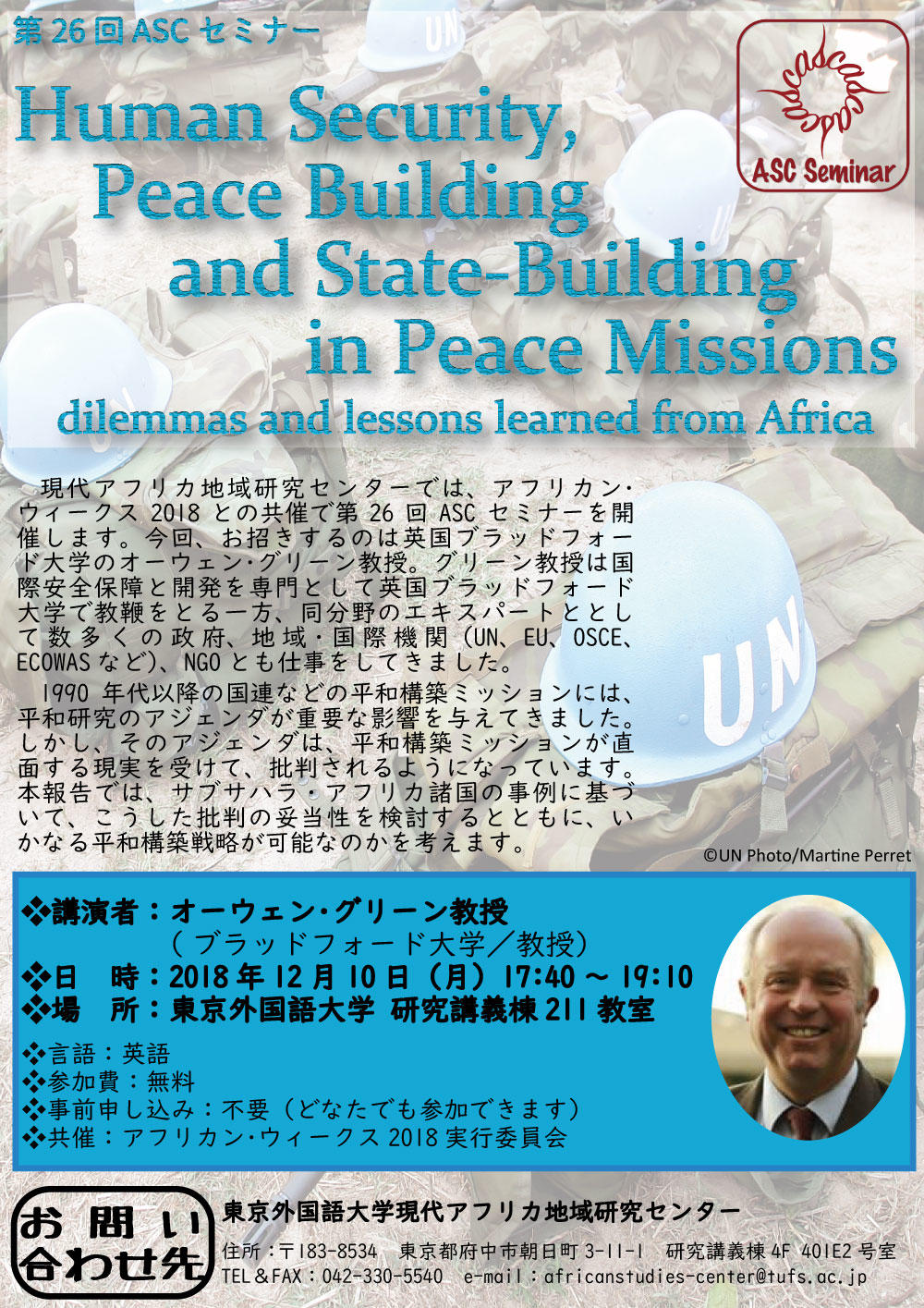現代アフリカ地域研究センターでは、アフリカン・ウィークス2018との共催で第26回ASCセミナーを開催します。今回、お招きするのは英国ブラッドフォード大学のオーウェン・グリーン教授。グリーン教授は国際安全保障と開発を専門として英国ブラッドフォード大学で教鞭をとる一方、同分野のエキスパートととして数多くの政府、地域・国際機関(UN、EU、OSCE、ECOWASなど)、NGOとも仕事をしてきました。
1990年代以降の国連などの平和構築ミッションには、平和研究のアジェンダが重要な影響を与えてきました。しかし、そのアジェンダは、平和構築ミッションが直面する現実を受けて、批判されるようになっています。本報告では、サブサハラ・アフリカ諸国の事例に基づいて、こうした批判の妥当性を検討するとともに、いかなる平和構築戦略が可能なのかを考えます。
◆演 題:Human Security, Peace Building and State-Building in Peace Missions: dilemmas and lessons learned from Africa
◆講演者:オーウェン・グリーン教授
(ブラッドフォード大学/教授)
◆要 旨:
This paper examines lessons-learned from Africa since the mid-2000s on the complex tensions and inter-relationships between supporting human security, peace-building and state-building in fragile states and societies in countries emerging from armed conflict or at high risk of large-scale violence.
The policies and practices of UN and other multilateral peace building missions and operations have developed substantially since the early 1990s. The concepts of peace-building have their origins in Peace Studies. Together with increased international prioritisation of human security, peace studies agendas played an important role in supporting the development of increasingly comprehensive UN approaches to post-conflict peace-building during the 1990s and early 2000s, in Africa and elsewhere. Since then, however, we argue that there has been increasing tension between the agendas and lessons-learned of policy and practitioner communities from multilateral peace-support missions and those of many civil society and academic peace researchers.
The Paper then critically examines critiques from peace researchers and others of UN and other multilateral peace-support missions since the mid-2000s. Although many of their critiques are valid, we argue that the implied alternative approaches also tend to lack credibility. A key reason for this is that they take insufficient account of the lessons-learned about the intrinsic challenges for their preferred peace-building approaches when attempted in profoundly fragile or conflict-affected societies. We use examples from Sub-Saharan Africa (West Africa and the Sahel, the Horn and Eastern Africa, and the Great Lakes Region) to demonstrate this argument and to outline possible ways forward for designing and implementing international peace-building strategies in these contexts.
◆略 歴:
Owen Greene is Professor of International Security and Development, and Director of Research and Knowledge Transfer, at Peace Studies and International Development, University of Bradford, UK. He has been Director or Co-Director of more than ten major international research programmes and a Principal Investigator in many others, and has published twelve books and over 220 research or policy articles, reports and chapters in the areas of conflict, security, peace-building, development and environment. He is an internationally recognized expert with a long track record of applied work to support international negotiations and policy and programme development in many countries in Africa as well as in Europe, Asia and the Middle East. In addition to his extensive applied work with many governments and regional and international organisations (including UN, EU, OSCE, ECOWAS, CSCAP), Owen works with a wide range of NGOs and civil society networks, several of which he has co-founded, chaired, or served as Board member. Amongst his areas of international expertise are conflict analysis and prevention; peace and security building in conflict-affected areas; community security; security and justice sector reform; conflict sensitive development; arms management and armed violence reduction; responding to trafficking; and effectiveness of international co-operation and of working in fragile and conflict affected areas.
◆日 時:2018年12月10日(月) 17:40~19:10
◆場 所:東京外国語大学 研究講義棟211教室
◆言語:英語
◆参加費:無料
◆事前申し込み:不要(どなたでも参加できます)
◆共催:アフリカン・ウィークス2018実行委員会


